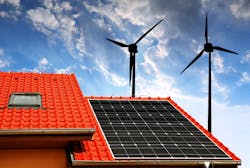Report: Distributed Energy Resources Mean Electric Grid is More Important Than Ever
A growing number of customers are choosing to generate and manage their own electricity needs through rooftop solar, onsite battery storage, and microgrids. They are also able to use less electricity because of efficient technologies. Does this mean the central electric grid, and the utilities that manage that grid, could become defunct?
Unlikely, according to “Value of the Grid,” a new white paper from the American Public Power Association. Increasing deployment of distributed energy resources and new uses of electricity mean the electric grid is more, not less, important than ever.
The paper examines why customers who prefer DIY electricity solutions will likely remain connected to the grid as a reliable, convenient backup source of electricity. It also points out that the growing use of electricity for transportation, water heating, and space heating increases dependence on the grid.
“I’d compare the electric grid to Amazon,” says Sue Kelly, president and CEO of the Association. “Amazon is constantly innovating for absolute customer convenience but they are able to deliver because they have a strong ecosystem — from transaction to delivery. Our ecosystem is the grid and the reliability it provides. The grid plays a central role in meeting evolving customer expectations.”
Despite decreasing costs and improving technologies, using a combination of solar and storage to power a typical house is still a relatively uneconomic option. Common residential storage devices only store about $1.50 worth of energy, yet cost several thousand to acquire and install. The system provides some backup power, but cannot meet all of the home’s energy needs for any significant amount of time. On the other hand, the grid is reliable and a typical electricity customer in the United States has power well over 99 percent of the time.
Electric utilities will continue to play an essential role in managing and integrating all these new technologies and uses of electricity but may need to evolve their business models.
Paul Zummo, the Association’s director of policy research and analysis and author of the paper explains that “The combination of electrification and distributed technologies requires a platform and entities to manage this platform. The grid will become even more important as these resources will need to be integrated in an efficient manner to ensure reliability. Though different models of grid management will emerge, the electric utility will continue to play an essential role.”
Changing customer expectations — and their ability to meet some of those expectations on their own — means electric utilities will have to reevaluate their business models. Public power utilities are well-positioned to adapt based on what their customers want because they have local control and are answerable only to their local communities.
Public power utilities could serve as a platform, or an essential integrator and provider of technological solutions. No matter which choice is made, the electric utility will continue to play an essential role in the future.
